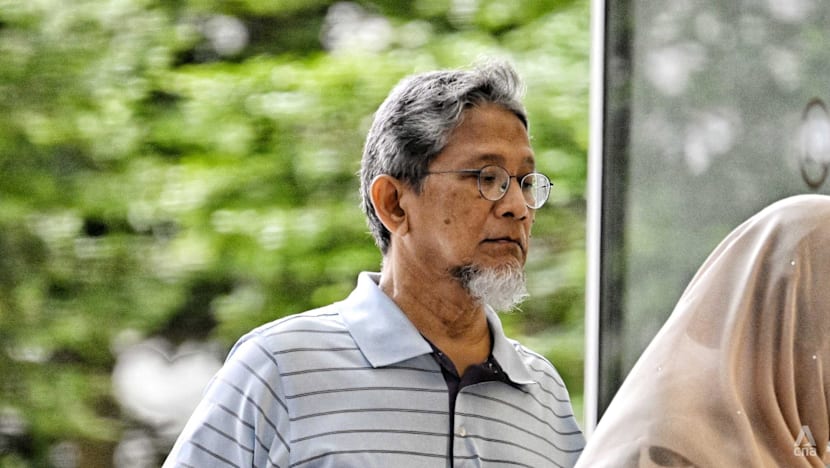3 ex-SMRT employees who cheated rail operator of S$4 million get jail
Two of the SMRT employees set up a company and roped in a third worker and a fourth man to act as a figurehead director to get contracts from the rail operator.

Former SMRT section manager Jamalludin Jumari arrives at the State Courts on Nov 12, 2025. (Photo: Â鶹/Wallace Woon)

This audio is generated by an AI tool.
SINGAPORE: Two SMRT Trains employees who worked in a branch dealing with the maintenance of railway tracks set up a company registered in someone else's name to secretly obtain work from their own employer.
The duo later roped in a third SMRT employee along with a fourth man to front the company and cheated SMRT of more than S$4 million (US$3 million), including a tender for timber sleepers worth S$3 million.
The four men contested their various charges of conspiring to cheat in a long-running trial that spanned several years, and were eventually convicted.
On Wednesday (Nov 12), all four men received jail terms of varying lengths.
The highest-ranked employee, former section manager of the Permanent Way Branch of SMRT Trains, 68-year-old Singaporean Jamalludin Jumari, was given four years and nine months' jail.
The Permanent Way Branch of SMRT was responsible for the maintenance of MRT railway tracks.
The same sentence was meted out to Jamalludin's accomplice, former assistant engineer at the same branch, 67-year-old Singaporean Zakaria Mohamed Shariff.
The third employee who was roped into the scheme, 60-year-old Singaporean Zulkifli Marwi, was a line manager at the same branch. He reported to Jamalludin and joined the conspiracy to conceal Jamalludin and Zakaria's interests from SMRT.
The fourth man, 68-year-old Singaporean Akbar Ali Tambishahib, was drawn into the scheme to be the figurehead director of the company, called Enovation Industries, and a second one set up later, called Enovation Technologies. He was Zakaria's childhood friend and was not an SMRT employee.
The judge found that Zulkifli and Akbar had a lower level of culpability than the other pair and sentenced them to 26 months' jail each.
THE CASE
Jamalludin began working at SMRT in 1994, while Zakaria was a technical officer at SMRT from 2007. Zulkifli began working for SMRT in 1992.
Zakaria reported to Zulkifli, who reported to Jamalludin.
According to the prosecution, Jamalludin and Zakaria decided to use their knowledge and skills to bid for contracts to supply goods and services to SMRT.
Knowing that they would have to declare their interest in the company and fearing they would be excluded from participation in the contracts, or worse, fired, the men got Akbar to act as the director of the company, said the prosecutor.
Akbar had no experience in trains or trackworks and was "nothing more than a front" while Jamalludin and Zakaria controlled the company.
Over time, the pair enlisted the help of Zulkifli, a line manager. He helped access confidential information to aid their bids and was the first-level endorser for many of Enovation's bids.
SMRT awarded 26 requests for quotations (RFQs) and two tenders to the Enovation companies over four-and-a-half years from 2007 to 2012.
In one instance, they planned to make a profit of more than 400 per cent, said the prosecution. In total, after 28 transactions, the amount cheated from SMRT and the wrongful gain made by Enovation exceeded S$4 million.
The tenders won by Enovation included a 2011 tender by SMRT for the supply, delivery and handling of 12,000 Kempas timber sleepers to replace deteriorating timber sleepers.
Enovation and five other tenderers submitted bids for the job, and Enovation had the lowest compliant bid, winning the tender valued at S$3.7 million.
The prosecution noted that Zulkifli was in charge of quality control for the timber sleepers in the first tender.
SMRT later found that the timber sleepers did not meet the required specifications and cited this in a letter terminating the timber sleeper contract.
The RFQs awarded by SMRT to Enovation include jobs for roller package parts, wrenches, track trolleys and hydraulic jacks.
SMRT later discovered the conflict of interest.
Jamalludin absconded in 2013 and was returned to Singapore from Malaysia to face his charges several years later.
The prosecution sought a jail term of between five and six years for Jamalludin and Zakaria, and between two-and-a-half years and three years for Akbar and Zulkifli.
Jamalludin was represented by Mr Paul Anpualagan and Mr Bhaskaran Sivasamy, while Mr Mohamed Niroze Idroos defended Zakaria.
Akbar was represented by Mr Andre Jumabhoy and Mr Aristotle Eng, and Mr Mohammad Shafiq Haja Maideen defended Zulkifli, who was in a wheelchair.
The penalties for abetment of cheating are a jail term of up to 10 years and a fine.

JUDGE'S COMMENTS
In sentencing, District Judge Eddy Tham said the offences involved the circumvention of internal guidelines of SMRT, a major provider of rail services to the public.
"Whilst it's a private organisation, it deals with the provision of a very vital transport service and it's of great importance that it's well-run, especially in terms of its infrastructure and delivery of its rail services," said Judge Tham.
He said "we've seen how disruptive" any rail service disruption, due to the failure of components or other defects, has been to the lives of daily commuters.
Therefore, strict adherence to company policies must be observed especially when it comes to the awarding of contracts related to maintenance components.
Judge Tham said there was a "grave breach of trust" on the part of the three SMRT employees in this case, as they had exploited the confidential information and experience they had acquired to gain a competitive advantage.
"While the defence tried to show that the contract-awarding process was robust and would prevent any price-rigging on their part, as they would not know what were the bids tendered by the competitors, and the awards would only be given to the lowest compliant quote, the fact that Jamalludin and Zakaria were part of the chain of approval and assessment of the quotes or bids would clearly undermine the integrity of SMRT's internal approval system," the judge said.
Zulkifli was the officer who had to perform quality control checks for many of the items acquired. The trio were clearly acting in "blatant conflict of interest" when performing their roles, said the judge.
He said the offences had the potential to harm SMRT's reputation.
While there was no evidence of the profit margins earned by the Enovation companies, the amount would "not be insignificant", given the size of the contracts.
Judge Tham noted that Jamalludin had initiated the scheme and invited Zakaria to work with him, and potentially stood to gain the most. He also held the highest position as a section manager.
Zulkifli had a lower culpability, as he did not initiate the scheme and did not directly benefit from the awards, said the judge.
Zulkifli's lawyer had argued for judicial mercy, as Zulkifli had suffered a stroke.
However, the judge found that the degree of hardship Zulkifli would be subjected to in prison did not reach a level where judicial mercy needed to be exercised. He had not shown that imprisonment would endanger his life, said the judge.
Except for Zulkifli, the other three men indicated their intention to lodge appeals.
Â鶹 has contacted SMRT for more information.









